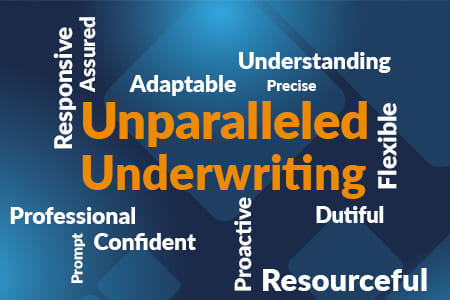Our SPV Buy-to-Let mortgage supports property investors looking to expand their rental portfolios.
Latest Case Studies
A First-Time Landlord Requires Careful Assessment
Read case studyAddressing How a Shortfall Would Be Covered for a BTL Investment
Read case studyBuy-to-Let Core Delivers Speed and Certainty for a First-Time UK Landlord
Read case studyDelivering Auction Finance Quickly for a First-Time Landlord
Read case studyGoing Through the Details for a Challenging BTL Investment
Read case studyHelping a Client Recover from Mortgage Arrears on a Buy-to-Let Property
Read case studyHelping a First-Time Landlord with a Multi-Unit Freehold Property Purchase
Read case studyHelping a Landlord with Tenants in Situ Cover an Existing Charge
Read case studyInternal Teamwork for a Complicated Deal with Multiple Properties
Read case studyProviding a Way Forward for a BTL Investor with Missed Payments
Read case studyReturning Offshore Borrower Looking to Overcome Tight BTL Deadlines, with Speed and Security
Read case studySpecialist Finance Options for Planning Permission Difficulties
Read case studyThe Tools at Our Disposal to Help with LTV Limits and Tricky Business Plans
Read case studyTop-Slicing to Support an Experienced Portfolio Landlord
Read case studyUsing Rolled-Up Interest to Boost the ICR and Find a Way Forward
Read case studySPV Mortgages for Buy-to-Let Property
We can support SPVs with up to 4 directors, who together own at least 75% of the special purpose entity. Just as is the case with all our Buy-to-Let mortgage variations, we assess your application on individual merits.
We’ll consider your background and that of your business setup when reviewing your enquiry or application. What’s more, we’re able to adapt to any business complications that may arise. Overseas income, credit impairment, or offshore trusts etc. will not hinder your claim.
SPV Buy-To-Let Mortgage –
All you need to know:
Features of SPV BTL mortgage
SPV buy-to-let mortgage criteria & requirements
- We designed this mortgage with the wider financial world in mind. Loans of up to £3m available for single properties, or £10m for portfolio or professional landlords
- Market Financial Solutions can process SPV mortgages just as quickly as our “regular” Buy-to-Let mortgages. Funding can be issued in mere weeks.
- We offer bridging-like speed and flexibility. A dedicated underwriter will support you throughout the process from day 1
- Funding available to property investors from anywhere in the world, with the exception of sanctioned countries
- You can use our SPV Buy-to-Let mortgagefor a range of property types across mainland England and Wales. This includes residential homes, new builds, flats above commercial properties, holiday lets and more
- We have a number of affordability and payment tools at our disposal to aid your mortgage requirements. For example, you may be able to utilise rolled-up interest plans, deferred interest, or top-slicing to progress your investment
- SPV finance that provide optionality on multiple fronts. Our term length of 10 or 25 years offers the possibility of exiting earlier, while remortgaging onto other bespoke Market Financial Solutions products is an option for those planning for the long-term
- A useful tailored product for property investors looking to share ownership in property and divide the proceeds or revenues effectively
- This mortgage is available for brokers and direct borrowers alike
What is a special purpose vehicle (SPV)?
A SPV is usually either a type of limited company, trust, or partnership. It’s specifically set up by those looking to invest in Buy-to-Let property via a corporate set up.
What is a SPV mortgage?
A special purpose vehicle mortgage is a financial product specifically designed with SPV setups in mind. At Market Financial Solutions, this mortgage is for Buy-to-Let investments.
Why do people invest through SPVs?
If utilised correctly, special purpose entities may allow property investors to cut their tax costs. Income and/or profits via a SPV can benefit from corporation tax perks, dividend allowances, and other incentives. However, the rules around these tax benefits can be complicated and Market Financial Solutions is not a financial advisor. If you’re looking to minimise your tax bill, you will want to seek out guidance from qualified accountants or tax advisors and other professionals.
Advantages of SPV finance
Applying for long-term finance through an SPV can allow for tax relief, and reduce overall costs. Especially for higher or additional taxpayers. You need to remember though, that tax rules can be complicated. There may be many other levies that are not affected by an SPV setup.
Examples may include capital gains tax, inheritance tax, income tax and more. If you want to fully address your tax options, you may want to work with accountants and/or financial planners.
As tax relief on mortgage interest was phased out from 2017 onwards, SPVs became popular among property investors looking to cover their tax efficiently. But there are many other advantages of using a SPV.
Generally, SPV’s have a singular purpose – to invest in assets like property. This can make them easier for SPV Buy-to-Let mortgage providers to understand and assess when compared to other kinds of companies. Ultimately, this may result in a smoother underwriting process.
Also, SPV finance can be useful for those whose personal finances may be less-than-perfect. Lots of lenders will focus on the SPV’s circumstances, meaning if you have a poor personal credit record, CCJs, or other issues in your history, they may not hold your investment plans back.
Applying for an SPV Buy-to-Let mortgage can present many benefits to property investors and fortunately, it’s relatively straightforward to set a SPV up. You can attempt to do so yourself online, where there’s plenty of guidance available on the process. Or, if you have an accountant or financial advisor, they could do it on your behalf. As always, we recommend discussing your situation with qualified professionals to ensure that you are choosing the right options for you.
Disadvantages of an SPV mortgage
Generally, mortgages for corporate setups, including SPV’s, require additional paperwork and due diligence when compared to mortgages for individuals. To reflect this added work, the interest rates and fees for SPV mortgages may be relatively high.
Some lenders may also require personal guarantees from your SPV’s directors. This would create liability issues which would need to be factored into your long-term planning. If you don’t keep up with the mortgage repayments, the directors will become liable.
Given all these added complexities, some high street lenders may not offer SPV Mortgages for Buy-to-Let at all. This could make long-term planning tricky. Add to this the increased reporting and record-keeping required of SPVs, and you’ll want to carefully consider your options when it comes to how you move forward.
If you’re unsure of whether investing via an SPV is right for your circumstances, you should seek guidance from a qualified financial advisor.
Property types this mortgage can be used for
Our SPV mortgages can be used for a range of property types, so long as they’re situated in England or Wales. This includes the more “simple” examples, such as residential homes, new builds, and flats.
But, we can also accommodate more complicated assets. Our SPV mortgages can be used for no room limit HMOs, student lets, MUFBs of up to 30 units, holiday lets and more.
Will applying through a special purpose entity slow down my application?
No, we’re able to work with corporate setups just as easily as we can with individual borrowers. In fact, on top of SPVs, we can issue funding to the self-employed, trading companies, LLPs and more.
Are SPV Buy-to-Let mortgage rates higher than other forms of Buy-to-Let finance?
We do not charge more for UK based SPVs compared to individual applicants. Across all our Buy-to-Let mortgage variations, your background and investment will affect the rates we can offer you.
Our mortgages have different tiers. These tiers ascend based on how complicated the investment. Tier 1 Buy-to-Let mortgages are for the most “standard”, while tier 3 loans are for particularly complex cases. The higher the tier, the higher the rates – reflecting the risks involved.
How much deposit do I need for an SPV mortgage?
Across all our BTL mortgage variants, we have a max LTV of either 70%, or 75%. Your underwriter will be able to break down the terms available to you from the opening stages of the underwriting process.
Can I apply for a SPV buy-to-let mortgage?
If you have a deposit of at least 25%, we should be able to assist with your property investment. With almost 20 years of experience behind us, we’ve developed expertise in overcoming any market related challenges. We’re happy to work with borrowers who may have an adverse credit history to their name, a challenging business environment, or even bankruptcies in their recent past.
Are there any limitations to Market Financial Solutions’ SPV finance?
Generally, SPVs setup specifically to hold/operate BTL properties, or relevant Trading Companies, or LLPs are acceptable. We can incorporate up to 4 directors who, combines, own at least 75% of the financial entity. Also, shareholders have to be over 18 and hold more than 20%.
Do Market Financial Solutions’ mortgage requirements include any additional fees?
Across our tracker and fixed Buy-to-Let mortgages, there is an admin fee of £199 per property. This is non-refundable and paid with the valuation fee. A debenture incorporating fixed & floating charge required to keep Market Financial Solutions informed of any future changes.
We will be underwrite your application from day 1. So you’ll be absolutely clear on the fees you’ll need to pay from the outset. That means there won’t be any unexpected or unwelcome costs.
Should I use a mortgage broker?
While we can work with brokers and direct borrowers alike, it may be worthwhile seeking out the expertise of a broker for your SPV application. You may also struggle to find the right SPV mortgage for you in the open market, given their limited availability.
Many SPV mortgages may only be available to brokers too, and can’t be applied for by direct borrowers. Brokers may be able to help you find a SPV mortgage quickly, allowing you to generate rental income sooner rather than later.
How to set up an SPV
A SPV is often the general term given to a corporate setup specifically created to invest in property. As such, SPVs can be a set up as a type of limited company, partnership, or trust. Given the variables involved, the easiest way to set up a SPV may be to simply delegate the task to an accountant.
But, if you do want to set it up yourself, you’ll need to head to the Companies House website. There is plenty of free guidance online on the step-by-step process required, but you will need to have the following ready to go at a minimum:
- The appointment of at least one director and one shareholder for the SPV
- Your SPV’s name, address, and director details
- A Memorandum of association (MOA) and Articles of association (AOA) which clearly outline the business’s details
- The percentage share of the company that will be allocated to the shareholders – any shareholder who holds 25% or more of the shares will be defined as a person with “significant control” (PSC)
- Personal details of any PSCs involved
- An appropriate Standard Industry Classification (SIC) code
Lenders require a SIC code to process a SPV Buy-to-Let mortgage application, with the following being applicable for BTL investment:
- 68100 – the buying and selling of own real estate
- 68201 – the renting and operating of Housing Association real estate
- 68209 – Other kinds letting and operating of own or leased real estate
- 68320 – the management of real estate on a fee/contract basis
Do SPVs pay Stamp Duty?
Stamp duty may be levied on SPVs in certain circumstances. If you buy a property as an individual, you will likely need to pay stamp duty. Should you then set up a SPV, you may then need to effectively sell the property to your SPV, resulting in an additional stamp duty levy.
As mentioned, understanding your tax obligations can be difficult. We are not accountants, nor do we offer financial advice so if you want to best understand your options, you’ll need to seek external advice.


















